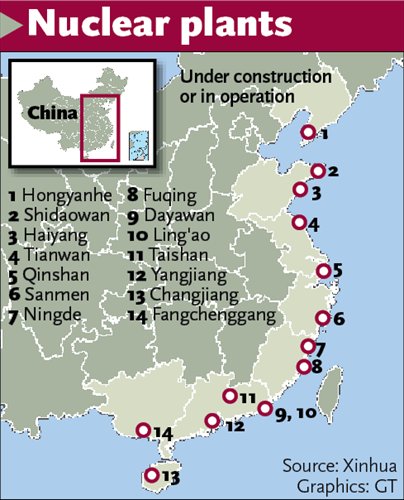China publishes nuclear safety white paper
China to have 54 reactors in total, more planned

Graphics: GT
China published its first nuclear white paper on Wednesday, detailing policies and measures to boost nuclear power emergency preparedness which will assuage public concern over the country's rapid expansion of nuclear power plants, experts said.
"China has consistently given top priority to nuclear safety in its peaceful use of nuclear energy," says the white paper, China's Nuclear Emergency Preparedness, published by the State Council Information Office.
Under pressure from China's increasing energy demands, as well as its pledge to peak CO2 emissions around 2030, nuclear power has become a main focus of the country's future energy strategy despite safety concerns among some scholars and members of the public.
The Chinese mainland is now home to 30 nuclear power generating units in operation, with a total installed capacity of 28.31 gigawatts. It also has 24 units with a total installed capacity of 26.72 gigawatts under construction, ranking first in the world, Xu Dazhe, director of the China Atomic Energy Authority, said Wednesday at a press conference.
Most of the nuclear plants are located in coastal areas, while China is still assessing the possibility of building inland ones, Xu said.
China intends to become a strong nuclear power country by 2030, the Xinhua News Agency reported.
Under such circumstances, the Chinese government has chosen an opportune moment to issue the white paper to make its nuclear development plans more transparent, experts said.
"The white paper shows China's determination to develop nuclear power as well as dispel public safety concerns over nuclear utilization," Gui Liming, an expert on China's nuclear safety system at Tsinghua University, told the Global Times Wednesday.
Booming nuclear power
The development of nuclear power constitutes an important component of China's nuclear energy sector, the white paper said.
The Chinese government put the brakes on nuclear power plant approvals after the Fukushima accident in Japan in 2011, calling for safety checks on nuclear power plants. Approval procedures were restarted in 2012 under pressure from increasing domestic demand for power, with the State Council approving the construction of eight nuclear power units in 2015, the highest number since Fukushima.
Drawing on the lessons learned from Fukushima, China has progressed in a full range of nuclear emergency-related activities, such as the enactment of laws and standards, the establishment of institutional and regulatory regimes, the building-up of basic capabilities, and international cooperation and exchanges, the white paper says.
"Unlike renewable energy such as wind and solar, nuclear energy is stable and efficient, which can meet the country's urgent demands for clean energy, though only a small portion of China's total electricity is generated from nuclear power plants," Gui said.
China has a combined annual power generation capacity of 5.618 trillion kilowatt hours, and nuclear power accounts for 3 percent of the total, the China Nuclear Energy Association reported in January.
The average global proportion for electricity generated by nuclear power is 14 percent, so China is in a great position to develop its nuclear projects, said Zhou Dadi, vice director of the China Energy Research Society.
"Nuclear accidents know no national boundaries. The release of the white paper shows Chinese government's improvement in safety awareness in developing nuclear energy," He Zuoxiu, a theoretical physicist at the Chinese Academy of Science, told the Global Times.
China will also speed up drafting its nuclear safety law and atomic energy law, while a new top-level national nuclear emergency rescue team of about 300 members to respond to serious nuclear accidents and international rescue operations is about to be established, according to the report.
Mixed response
Some experts warned that potential dangers still lurk behind the booming industry.
The disposal of nuclear waste remains an international obstacle that hinders the development of nuclear power. China has yet to implement enough measures to develop safety control technology and facilities for nuclear power plants, He said.
Gui, on the other hand, said safety concerns should not stunt the industry, since China has mature nuclear technology, while the newly released white paper will also raise people's safety awareness of nuclear power.
"The white paper will help the public to understand the great potential of nuclear power, as well as soothe their nerves over the safe use of nuclear energy," Gui noted.
Xu of the China Atomic Energy Authority also said Wednesday that the country is planning to build floating nuclear power stations on the sea, which will go through strict evaluation before being built.
China absolutely needs to develop marine sources on its waters, Xu said, adding that China upholds the principle of the peaceful use of nuclear power.
Newspaper headline: Govt dispels nuclear anxiety